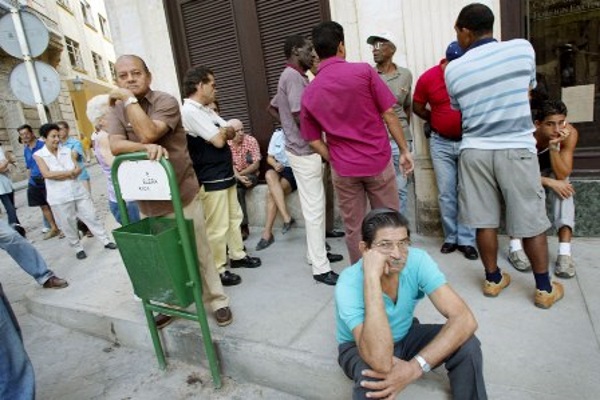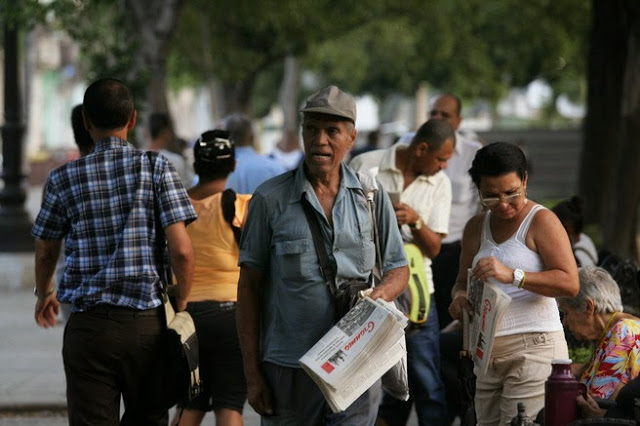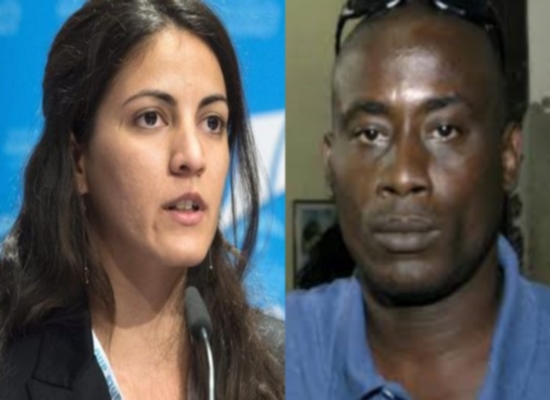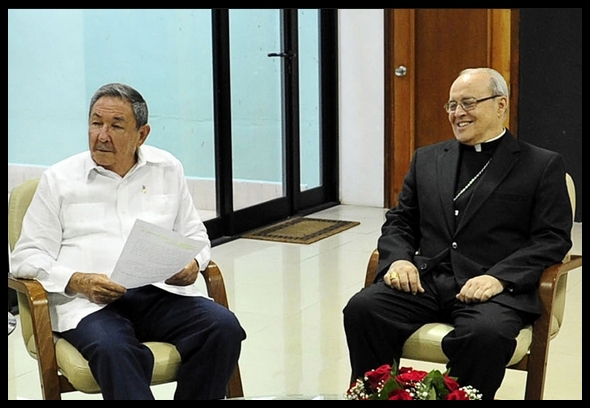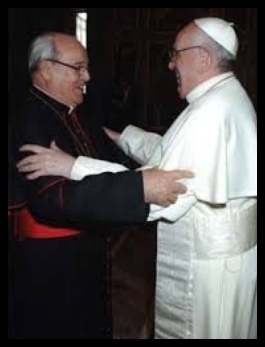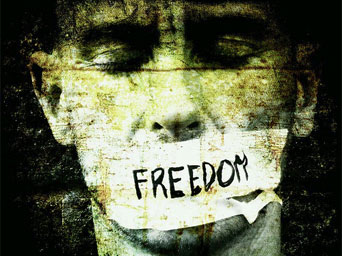Your message to Desiderio has motivated me to add some ideas to this debate, which, to my taste, has left us with an excess of words in the middle of a desert of actions. Compared with the richness of ideas and reflections that have been heard, the last UNEAC declaration borders on the outrageous, due to its greyness and shallowness. On the other hand, I think you are the only one from the critics’ guild who seems to have gained a level of sensitivity regarding the controversy, such that I am grateful that in your writing you make it clear that what you call civic responsibility also concerns those of us who are trying to be mindful about Cuban cinema.
I wish to ponder a couple of the things in your reflection. Those that are not concerned with the anecdote, but rather to that way of assuming our lives which has become for us something natural. I think that a hundred years can go by and still no Cuban (be he or she from Havana or Miami, Camagüey or Madrid) will ever leave aside that Hollywood-style vision of life, where those who don’t agree with our own opinions are the villains, and only the ones who think exactly like us are the only ones to be trusted. We all know that this is nonsense, but we have become hardline with regard to that concept. It is almost an addiction. continue reading
I would like to speak, as you have, of Cuban cinema. I think it is still a pristine terrain for discussion. Generally, we discuss with more vigor the pertinence that Forrest Gump obtained so many Oscars, rather than discussing the effectiveness of our own cinema. This does not mean that it is not important to talk about the Oscars, as long as it is examined from a critical perspective and as a cultural phenomenon. Gratuitous Oscarphobia is as harmful and petulant as Oscarmania.
I still insist that Cuban cinema is studied much better outside of Cuba (for example in France or the United States), than in our country. This is because to speak critically about the history of Cuban film means to subject to physicalization the relationship that this artistic expression maintains over nearly five decades to the political vanguard. And from Cuba, that’s quite complex to undertake, because it can upset that vanguard. You mention the case of “Alice in Wondertown,” but you have to go back to “PM”* and even take into account “Memories of Underdevelopment,” and the reaction of certain political commissars when, in the height of the pavonato, “A Day in November” was made, but only released six years later. Or, equally, you can talk about “Glass Roof.” Or of “The Enchantment of Return,” never shown despite having won the Caracol Prize or something like that.
The example of the Cuban cinema during the Five Grey Years is no less paradoxical. It is true that a film like “A Day in November” was held for six or seven years without being released, because it was completed in that time when the cultural politics represented by Pavón (notinvented by him) became natural law, and the first charge that since the “First Congress on Education and Culture” was assigned to the Cuban Institute of Cinematographic Art and Industry (ICAIC) was still sounding, which is the increase in historical films that would help legitimizethose hundred years of struggle for national independence.
A story like that of [Humberto]Solás, for all its more edifying end, seemed doomed not to fall within the permissible parameters of the censors, who were more attentive to the protests of the intellectuals in the case of Padilla, that the potential criticism could come from within. Only Titón [filmmaker Tomás Gutiérrez Alea’s nickname] was shrewd enough to turn the storyline of “A Cuban Fight Against Demons” into a contemporary analysis of what could be ideological intolerance; and the same with “The Last Supper,” in which one can see a portrait of something that we have never shaken off: the double standard. Titón himself would later say, during one of his final interviews, that because the Church and the Party had so many things in common, the story of “The Last Supper” could be extrapolated without much effort.
I believe that the responsibility around this lack of debate about Cuban cinema in the country is a shared one. In this, I could seem incendiary. But it’s not just about those who do the censoring on television, even though the responsibility borne by these individuals is certain. There is also much responsibility borne by critics and filmmakers, who may have preferred to ensure our next book or shoot before discussing ad nauseam what is obviously an outrage: the censoring of national films on our own national television.
I recall that I once took part as a delegate in one of the UNEAC Congresses, and the point that I wanted to make was precisely that: the absence of Cuban cinema on television. The official in charge of the event at the time told me that there were more important things to discuss, and suggested “other problems” to highlight. I also remember that during this same event, Rolando Pérez Betancourt brought up the same issue, arguing in great detail and very intelligently every one of those matters you outline. And nothing happened.
“Strawberry and Chocolate” continues to be excluded from our domestic television, although Cubavisión Internacional does broadcast it regularly. Somebody has decided that the Cuban television viewer (the domestic one) is an intellectual minor and, despite so much instruction and level of education, is not competent enough to view such a film. This way of thinking reminds me of an ingenious phrase by Julio García Espinosa, when he speaks of “cinema’s double standard.”
Even so, my question goes deeper: amidst all this, whither the Cuban filmmakers? We already know that the critics cannot schedule “Strawberry and Chocolate” to air on television, because rules are rules, and they must be followed. They are not in charge–although, of course, they do have a voice, and that privilege of public declaration that has been granted them should be exploited for reflecting on what is really lacking in society, and not about what the media bosses want discussed. All things considered, the existence of Cuban cinema within a television framework seems crazy, for it is as if two conversations in different languages were going on. On the one hand, television, with its inveterate celebratory tradition; on the other, Cuban cinema, with its tendency to show a more complex view of reality, and to humanize the image of a country which, as all others that I know, contains much that is of pain and laughter.
That filmmakers exert no real influence on Cuban media is obvious. What is not clear to me is to what point filmmakers appear determined to denounce this situation, to oppose it, and to not become accomplices to the absurdity. I have defended a viewpoint that has garnered me a plethora of detractors. Some time ago, I published a little essay that I titled, ” ‘The Confiscated Utopia’: From the Gravity of Dreams to the Lightness of Realism,” which, unmistakably sought to promote an “intelligent” discussion amongst filmmakers and critics. The essay was barely answered (considered) by a pair of producers (Arturo Sotto, Jorge Luis Sánchez), considering the many rumors and “hallway gossip” written, as I always say, on rolling paper. In my opinion, this was proof that intellectual organicness had been confiscated within Cuban cinema. And I speak not of common intellectual organicness, but that of the artist who, being heretical by nature, opts for silence, which is not a natural condition, but rather an imposed one.
The thesis of “The Confiscated Utopia” also spoke to the need of leaving aside those false divisions in which creators and critics see themselves as irreconcilable antagonists. As far as I know, this thinking is not exclusive to critics, and criticism can be creative. But this creative thinking starts at home, and perhaps this is a hasty judgment, but filmmakers in Cuba at some point gave up that common goal which used to be associated with a Titón, a García Espinosa or a Solás, so as to be able to face a more difficult survival.
The impulse to survive makes us selfish, because what it imposes is “every man for himself,” and measured thinking is left by the wayside. I still insist on the thesis, then, until such time I am convinced otherwise.
I admit that what I’m saying is no more than a personal impression. The grave matter is that almost nobody in Cuba is interested in discussing this. In our collective imaginary, the ICAIC continues to be an island within the Island, which influences even the way in which filmmakers conceive their works.
No few of these films still use the same model of portrayal that was in vogue in the early ’60s. As if time had stood still. As if it were Robinson Crusoe filming himself. Or as if 1959 were around the corner. Nor is it about trying to make another “Memories of Underdevelopment” or “Lucía,” but rather of feeding from that same heretical animus that mobilized production during that decade, that impulse that went beyond the ideological function to transform itself into the paradigm of a cultural phenomenon (the new Latin American cinema), which lives on in memory.
Outside the country, many criticize the ICAIC because they consider it a mere propaganda machine for the system, but the demand for a national cinema was already present in the ’50s, and it was that combination of yearnings (aesthetic and ideological) that facilitated the rapid ascension of our cinema to a position of leadership in the continent. Today that leadership is non-existent. It is enough to compare the gross of more recent Cuban films with Latin American films that are currently at the top of certain innovative movements, and one will see to what degree we have remained isolated in this domain, too. Not even good political cinema (such as the documentary by Santiago Alvarez), nor innovative cinema in the esthetic sense.
The only way to recapture that creative animus of yesteryear is having dialogue ad nauseam, deploying the narrative arsenal, converting the hallways of the ICAIC into a mobile cinematheque wherein people live cinema, not live off it. And above all, learning to debate each other, because amongst ourselves (filmmakers and critics) there still predominates that primitive feeling that makes us think that any disagreement is a personal problem, if not a political one.
Although I am interested in the culture of polemics, I do not like gratuitous argument. I believe that there are many people living off that ancient tool which is the insult flung at he who does not think like you. That is not the case with us. Your piece has made me think, and that is what matters. Unfortunately, the controversies surrounding Cuban cinema have swirled around other interests besides those of cinema itself. And almost always they have ended silenced by circumstances that tomorrow will cease to exist, while influencing too much the actual lives of filmmakers.
Nobody can give back to Daniel Díaz Torres (not the filmmaker, but the human being) the peace that was taken from him during those bad times of “Alice in Wondertown,” just as nobody can return to Titón and Tabío their tranquillity after Fidel’s public criticism of “Guantanamera.” Or to Solás for his disagreements following “A November Day,” or “Cecilia.” That is perhaps the saddest thing that happens with those “cultural policies,” designed with apparent good intentions, policies that speak much about collective principles, and very little about flesh-and-blood beings. They are policies which, as all such policies do, eventually dehumanize art and its reception by the public.
Because I am still interested in supporting the idea of critical thinking on the inside (which, for some, is symptomatic of the most decadent naiveté), then I want to applaud your text as one of the most lucid connected to Cuban cinema that I have read in a long time. And I am gladdened that it comes from someone who works within the ICAIC–that is, from an artist who can think. Would that this be the prelude to that day in which debate in Cuba (the nation, and not just the physical island) will become what it should be: the way to our common betterment.
A hug,
Juan Antonio García Borrero
Another Message from Juan Antonio García Borrero, to Gustavo Arcos Fernández-Brito:
My Dear Gustav:
Like everything in this life, the Internet has its indisputable advantages, but also its dark side. If, on the one hand, thanks to the Internet, the public sphere appears to recover some of its autonomy (as is demonstrated by this debate that right now keeps us occupied and which, fortunately, nobody can control or maneuver towards an expressed end), on the other it runs the risk of total dispersion. I admit, then, that it has been error to say that Colina is the only Cuban critic showing himself to be sensitized to the matter. I should have said that he was the only one I knew, and thus avoid that simplistic vision that I myself have tried to combat with the previous writing. I would appreciate, then, if you would send me Luciano’s thoughts, those of Frank, and yours, which surely will be most useful to me. As the best philosopher to have ever peeked out from a screen has said, “Nobody’s perfect.”
Another aspect that I should qualify is that reference to critical thinking “on the inside.” It is a statement that appears to say that those of us who inhabit the Island have the monopoly on truth, when, in fact, there are all kinds in the Lord’s Vinyard. There is one who lives in Miami and has never left the pre-revolutionary Vedado district. There is another one who lives in Upper Mayarí and who from there can perceive with much more clarity what the current state of the world is, especially when he goes to a grocery store that is nothing like the ones in Vedado.
But there is one who lives in some uncertain place in the Cuban nation, not the physical but the imagined one, and he knows that this is not a movie about good guys and bad guys, but rather something more complex. Critical thinking (if it is real and tries to adjust to the rigor of contrasts) surely benefits adversaries, and causes them to discover completely new areas of controversy, be it in Havana or Madrid. In the end, nobody makes an argument to impose a vision for life, but rather so that those who come later will achieve a superior point of view.
But, let us speak of cinema, which is what interests me right now (even when I know that cinema is not the most urgent problem that this country needs to solve). I see that on his blog, Duanel Díaz argues against my vision of revolutionary cinema. His is a view I respect, even though I don’t share it. I don’t want to be too naive, but neither do I want to be ungrateful. I admit that no film is no film is innocent, and since “Juan Quin Quin” up to today, passing “Strawberry and Chocolate” and reaching “Havana Suite,” Cubans of my generation have been trained by the worldviews articulated in those films.
And I am grateful for this, because it has allowed me to take part in a cinema that is not simple evasion, that is not a substitute for that trash that they try to uncritically sell us on “The Saturday Movie,” and which rather than stimulate a critical sense in the spectator, what it does is contribute to his alienation. I don’t have anything against entertainment, for without this insurance we would go straight to suicide, but what does leave me unsatisfied is this attitude on the part of national television, which on the one hand hurls invective at imperialism on The Round Table, and two hours later, on the same channels, shows the worst of “the Enemy’s” cinema? Or that censors the films of the ICAIC, and converts into a “free zone” of the most questionable Hollywood ideas the majority of its film timeslots (there are always exceptions, and we know of colleagues who insist on promoting another type of cinema, be it Latin American, Iranian, European or North American).
I have defended and will continue to defend the cinema of the ICAIC, because films have been made under its auspices that will endure beyond our isolated conflicts. Because in many of their narratives can be found the uncertainties of an age, and not only the strict anecdotes of a Revolution that, as do all, leaves in its wake winners and losers, joys and sorrows. Those who insist on attacking the cinema of the ICAIC for its ideological suppositions are losing sight of the fact that we speak of a production that was (is) conceived by human beings, and not by machines that say “yes” or “no” to everything. A simplistic apologia for the system? Then where would we leave the irreverence of Guillén Landrián? The disturbing questions posed by Sara Gómez in those documentaries about “An Island for Miguel”? The banishment of Fausto Canel? The absence of Alberto Roldán? The uninhibitidness of “Memories of Underdevelopment”? The existential doubts of the main character in “A Day in November”?
If this had been only a reaffirmative production, then the cinema produced by Cubans in the diaspora would have had better results, taking into account that it has enjoyed a greater freedom of expression. But what has happened is that the cinema of the ICAIC has been produced with another kind of intentionality: the ideological was converted to the aesthetic from the moment in which it coincided with a time that demanded these changes, and more. The cinema of the ICAIC was one more within that cinematic group (such as the Polish cinema, the “Free Cinema,” the “Cinema Novo,” or Solana and Getino’s “Third Cinema”) which intended to blow up the more-usual model of portrayal. It is true that the ICAIC’s cinema with a violent rupture in the political sphere (the Revolution), but even before then, the dissatisfaction with the Cuban cinema of yesteryear was well-known. Even “PM” was part of this desire to experiment with the language of film.
To attach the ICAIC solely from the ideological point of view reduces the analysis to just the backing that its production has had from the State. The thing is, this backing has not been so transparent, if we review the relationship that this institution has maintained with the political vanguard: at least three or four films have caused major disagreements (think of “Cecilia,” “Alice in Wondertown,” or “Guantanamera”)–while others, such as “Parting of the Ways,” “Supporting Roles,” “Glass Roof,” and “Think of Me,” have incited more than one official resentment.
On the other hand, to judge Titón’s body of work–to mention one–only from the standpoint of political militancy, is to lose what is human about that creation. Whoever reads his letters knows that Titón posed the same questions during the 1950s, because he was already interested in the finiteness of being; thus the almost constant presence of Death in his films. But upon ignoring that matter it could be that the interpretation [of his work] leads to the political observations we already know from “Guantanamera.”
I think that within this cinema of the ICAIC, many times, beyond ideology, it is possible to detect the behavior of the more common mentalities; while at other times I have noted that it’s necessary to speak of Cuban cinema in general, and not only that of the ICAIC, because in this underground cinema not mentioned by Colina, which is ommitted on television (and to which Belkis Vega makes reference in her reflection), we can also sense many of the hopes and dreams of the Cuban.
I do not doubt that the ICAIC has its questionable aspects, and that some of its films militate for the most Manichean viewpoint, but I don’t believe that this has been the rule. Actually, what should be most of interest right now to the historian of Cuban cinema is exploring those hidden tensions between the individual and society, and which have made possible so many films that have more than one message. This will to explore is yet unseen, perhaps because prudence is outweighing defiance. Or because that deceitful and often visceral message is predominating that alerts us that, still, “now is not the time.”
Even so, the urgency of this necessary debate about our cinema has been postponed vis-a-vis the evidence of a mystery that I confess is really absurd: What is the exact motive that impedes that a good portion of Cuban cinema is not broadcast on national television? For those who have systematically attacked the Revolution for what it represses, it is clear that the issue is a problem of freedom of expression. I refuse to believe that it is something this vulgar, because it is obvious that these films are not counterrevolutionary. I mean to say, they are not, “Bitter Sugar” or “The Lost City.”**
However primitive might be the mentality of a bureaucrat in power, he knows that this is not the best way to protect the Revolution–or, at least, he will have advisers sensitive to cultural matters who will bring him up to date on those international prizes won by “Strawberry and Chocolate” and “Havana Suite” [by Fernando Pérez], which makes it a true blunder to make into hostages of the shadow these things are so well-known internationally.
It is true that these functionaries have the power to make decisions, but I also like to remember that when the dissolution of the ICAIC was announced almost by decree following the “Alice in Wondertown” brouhaha, it was those very filmmakers (on the inside) who rejected that decision, which had come from very high levels. One proof that the power of reason cannot always be silenced by reason of power.
My suspicion is that right now, filmmakers and critics are divided over questions of survival more than of thinking, and that is something that the bureaucracy knows how to exploit. Everyone pursues his own interests, because it is more important to obtain financing for the film itself than to support, at any cost, a national cinema project (because only the showing of our films on television would confirm that this film project exists). And, after all, this does not fall within the priorities of a filmmaker anxious to demand that our films be shown to the public for whom these works have been originally conceived: for the domestic audience. Neither does fostering spaces where thought and systematic debate will make life intellectually impossible for that bureaucracy. It’s a matter of a time, they’ll tell me, and this is true. An ICAIC production center is no longer essential to propel a project. Because, although production has been democratized, showings have not.
Filmmakers who are not from Hollywood still depend first on festivals, then on the support of their respective countries (filmmakers outside of Cuba don’t enjoy much of this–just look at the case of Cuban filmmakers in the diaspora), and finally, on the television channel interested in broadcasting that type of product. Therefore, the problem is a really important one that has to do with our audiovisual memory (wherever Cubans may be), and which would be worth discussing by those who examine “political cultures” in general, or by political antagonists who try to invalidate each other because of irreconcilable differences. It cannot even occur to us to believe that Cuban television could not be proud to show on its screens that which in other places is assumed to be part of the revolutionary culture. In fact, it will be difficult to explain to our grandchildren why a film such as “Strawberry and Chocolate” took more than a decade to be seen on television, despite the Revolution’s fervor for the national [film] project. If it seems absurd, in five decades it will seem pathetic.
I’m sure I’ve left out a thousand things, and I don’t doubt that opinions will emerge that will try to discredit what I’ve expounded-on here to you. But as I think I told you in another message, I am not interested in uttering ultimate truths, only in sowing a few concerns surrounding this that we barely know: the history of Cuban cinema. This is only my version of the problem, one of many which, according to the moral of [the Kurosawa film] Rashomon, could explain the matter. New opinions will surely improve it, and hopefully more than one colleague will feel inspired to participate.
Another Hug,
Juan Antonio García Borrero
Translated by: Alicia Barraqué Ellison, and others.
Translator’s Notes:
* “PM” is “Pasado Meridiano,” a 1961 documentary of Havana nightlife which, among other factors, provoked Fidel Castro’s “Speech to the Intellectuals“.
** Both of these films were made by Cubans in exile.
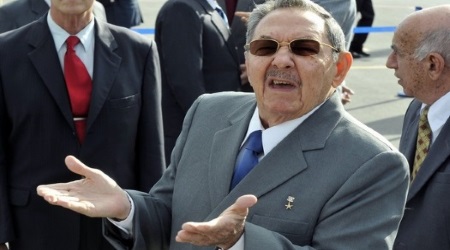
 Cubanet, Rafael Alcides, Havana, 26 May 2015 – From a distance I saw them arguing. They were father and son—they could not be heard, but their animated gesticulations spoke volumes. The son, already in his 60s; the father, a captain in the Sierra, who escaped from the Party a while back, is a person I’ve always gotten along with, although we are not intimate friends. Finishing the discussion, the son was telling him, as I approached, “I will not forgive you for that.” And the captain, catching up with me, replied, “Because you’re blind.”
Cubanet, Rafael Alcides, Havana, 26 May 2015 – From a distance I saw them arguing. They were father and son—they could not be heard, but their animated gesticulations spoke volumes. The son, already in his 60s; the father, a captain in the Sierra, who escaped from the Party a while back, is a person I’ve always gotten along with, although we are not intimate friends. Finishing the discussion, the son was telling him, as I approached, “I will not forgive you for that.” And the captain, catching up with me, replied, “Because you’re blind.”

